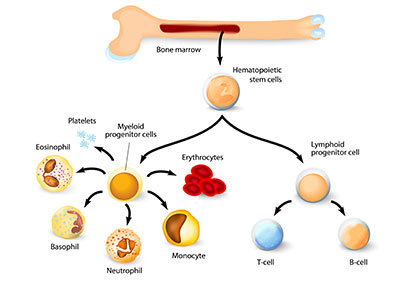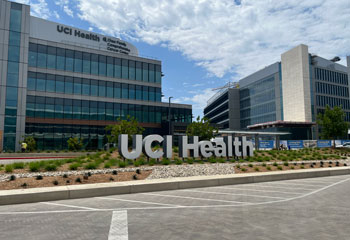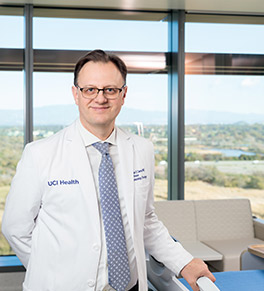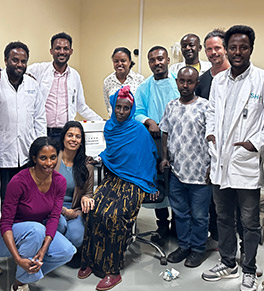Stem Cell Transplant and Cellular Therapy Services
UCI Health Chao Family Comprehensive Cancer Center is expanding treatment options for cancers of the blood or lymph systems with the launch of Orange County's first adult bone marrow transplant program.
Patients with diseases such as leukemia, lymphoma and multiple myeloma now can benefit from life-saving infusions of healthy blood stem cells. Called the Hematopoietic Stem Cell Transplant and Cellular Therapy Program, it also opens the way to emerging immunotherapy options, such as CAR T-cell therapy, for patients with many types of cancer.
Our internationally recognized stem-cell transplant experts also provide full pre-and-post transplant follow-up, allowing patients to receive high-quality, seamless care close to home. And as Orange County's only National Cancer Institute-designated comprehensive cancer center, our patients also have access to early-phase clinical trials and advanced therapies before they are available elsewhere.
To make an appointment with our stem cell transplant specialists, please call 714-456-8000 or request an appointment.
Expert team
The Hematopoietic Stem Cell Transplant and Cellular Therapy Program has an experienced team led by Stefan O. Ciurea, MD, an international leader in stem cell transplantation and cellular therapies. Ciurea pioneered the use of haploidentical donors for transplantation as well as a promising new approach using natural killer (NK) cells to decrease relapse after transplant.
Other stem cell transplant physicians include:
- Stefan O. Ciurea, MD
- Piyanuch Kongtim, MD, PhD
- Jorge Ramos Perez, MD
- Polina Bellman, MD
- Deepa Jeyakumar, MD
Our multidisciplinary team also includes:
- Hematologists (doctors specializing in blood conditions)
- Radiation oncologists
- Experts in immunology, infectious disease, pulmonary (lung-related), cardiology (heart conditions), gastroenterology (the digestive tract), dermatology and transfusion medicine
- Nurse coordinators, social workers, dietitians and support groups
CAR T-cell and other therapies
UCI Health also has a growing number of cellular therapy clinical trials for patients with hematological malignancies and solid tumors. Among the most promising is CAR T-cell therapy, an innovative treatment for certain blood cancers that is also being studied as a treatment for other cancer types.
T-cells are often called the workhorses of the immune system because they play a critical role in orchestrating the body’s immune response and killing cells infected by pathogens.
The therapy requires drawing blood from the patient and separating out the T-cells. These cells are then genetically engineered to produce receptors on their surface called chimeric antigen receptors (CARs). The receptors allow T-cells to recognize and bind to a specific protein, or antigen, on the cancer cells. Once the T-cells have been engineered, they are multiplied in the laboratory into the hundreds of millions and infused into the patient. The engineered cells further multiply in the patient’s body and are guided by the receptors to recognize and kill cancer cells with the targeted antigen on their surfaces.
Other cellular therapies we are studying include natural killer cells, lymphocytes modified to target viruses that can occur post-transplant, dendritic cells and others.
What is a bone marrow transplant?
 Bone marrow is the soft, spongy material found inside bones where the body’s blood cells are produced. It’s found in the center of most bones and has many blood vessels.
Bone marrow is the soft, spongy material found inside bones where the body’s blood cells are produced. It’s found in the center of most bones and has many blood vessels.
There are two types of bone marrow: red and yellow. Red marrow contains hematopoietic stem cells, the immature cells that eventually develop into three types of blood cells:
- Red blood cells (carry oxygen)
- White blood cells (fight infection)
- Platelets (clot the blood)
A bone marrow transplant is a procedure to infuse your body with healthy blood-forming stem cells to replace damaged or diseased cells that have been affected by cancer. A bone marrow transplant is also called a stem cell transplant. The medical term for these transplants is “hematopoietic cell transplantation."
All transplants used to treat cancers of the blood or bone marrow involve stem cells. The difference is in the source of those cells. They may be taken from your own body (an autologous transplant) or from a donor (an allogeneic transplant). The source is determined by the type of cancer being treated and what will be the best match for the person.
You may need a transplant if your bone marrow stops producing enough healthy blood cells. Bone marrow transplants can:
- Rescue healthy bone marrow cells before a cancer treatment that requires high doses of chemotherapy or radiation.
- Replace diseased or damaged marrow with new stem cells
- Provide new stem cells that can help kill cancer cells directly
Survival rates for many cancers have increased dramatically because of bone marrow transplants. It offers hope for people with conditions such as:
- Leukemia: Cancer that begins in the white blood cells as they develop in bone marrow
- Hodgkin's and Non-Hodgkin's lymphoma: Cancer that develops in the lymph nodes (site of infection-fighting cells)
- Multiple myeloma: Cancer that starts in the bone marrow's plasma cells
- Sickle cell anemia: An inherited disease that causes poorly shaped red blood cells (the cells that carry oxygen through the body)
There are two types stem cell transplants: autologous (using stem cells from your body) and allogeneic (using donor stem cells).
Autologous stem cell transplant
In an autologous transplant, the patient is given a "mobilizing" medication to stimulate the bone marrow to produce hematopoietic stem cells, which are collected once they begin circulating in the blood stream. These cells are stored then given back to the patient after treatment. This may be an option for lymphoma or myeloma patients whose body is producing enough healthy stem cells. There is little to no risk of rejection, and because the stem cells come from the same immune system, it's safer than allogeneic transplants.
Autologous stem cell transplants are most often used to treat:
|
|
Undergoing an autologous stem cell transplant involves:
- Taking medications to increase the number of stem cells in your blood: This causes the stem cells to move from your bone marrow and into your blood, where they can be easily collected.
- Filtering stem cells from your blood (apheresis): A needle is inserted into a vein in your arm to draw out your blood. A machine filters out the stem cells and the rest of your blood is returned to your body. A preservative is added to your stem cells, which are frozen and stored for later use.
- Undergoing high doses of cancer treatment (conditioning): During the conditioning process, you'll receive high doses of chemotherapy or radiation therapy — or sometimes both — to kill your cancer cells. Which treatment you undergo depends on your disease and your particular situation. The cancer treatments used during the conditioning process carry a risk of side effects. Talk with your doctor about what you can expect from your treatment.
- Receiving an infusion of stem cells: After conditioning, your stem cells are infused into your bloodstream, where they will travel to your bone marrow and begin creating new blood cells.
Once you've had the autologous stem cell transplant, you'll remain under close medical care. You will meet with your care team frequently in order to watch for side effects and monitor your body's response to the transplant.
Allogeneic stem cell transplant
An allogeneic bone marrow (stem cell) transplant uses healthy donor stem cells to replace your diseased or damaged bone marrow. A donor may be a family member or someone you don't know. Unlike autologous transplants, they generate a new immune system response to fight cancer. The downside is an increased risk of rejection and GVHD (graft versus host disease), in which the donor cells attack the host's body.
Blood stem cells used in an allogeneic stem cell transplant can be:
- Collected from the donor's blood
- Collected from the bone marrow of the donor's hipbone
- Collected from the blood of a donated umbilical cord
An allogeneic bone marrow transplant is used to treat both cancerous (malignant) and noncancerous (benign) diseases including:
|
|
Undergoing a transplant with donor cells involves:
- High doses of cancer treatment (conditioning). During the conditioning process, you'll receive high doses of chemotherapy and/or radiation therapy to kill your cancer cells. The treatment you undergo depends on your disease and situation. Ask your doctor what to expect from your cancer treatment.
- Receiving infusion of stem cells. Stem cells from your donor will be infused into your bloodstream, where they will travel to your bone marrow. It takes a few weeks for the donor cells to settle in your bone marrow and begin making new cells. You may receive blood transfusions until your bone marrow begins producing new cells.
- Remaining under close medical care. After the transplant, your care team will monitor you carefully for signs of complications. Expect frequent blood tests and appointments to monitor your body's response to the transplant. Occasionally, readmission to the hospital may be needed.
Finding donors
Stem cell transplant patients are matched with eligible donors by human leukocyte antigen (HLA) typing. HLA are proteins that exist on the surface of most cells in the body. HLA markers help the body distinguish normal cells from foreign cells, such as cancer cells. HLA typing is done by comparing a patient's blood with samples from a family member or a donor registry. It can sometimes take several weeks to find a suitable donor, longer for unrelated donors. In general, the closest possible match between the HLA markers of the donor and the patient reduces complications and has been traditionally preferred. However, over the last decade, the use of HLA half-matched related donors has proven successful.
The best match is usually a first-degree relative (siblings). However, about 75% of patients do not have a suitable donor in their family and require cells from matched unrelated donors (MUD), who are located through registries such as the National Marrow Donor Program.
Haploidentical donors — related donors who are a half-match, often a parent or child — are increasingly being used for transplantation. The great majority of patients will have a half-matched relative and occasionally these donors are preferred when an urgent transplant is needed.
Transplant side effects
Because the patient’s immune system was wiped out before a stem cell transplant, it takes at least six to 12 months for the immune system to recover. Some possible complications of bone marrow transplants during this process can be serious, including:
|
|
Who is a candidate?
If your doctor believes you may be a candidate for a stem cell transplant, our team will evaluate you thoroughly and provide you with a customized treatment plan. We will review the risks, benefits and potential side effects of this procedure with you and recommend the best approach to minimize toxicities and maximize treatment outcomes.
To make an appointment with our stem cell transplant specialists, please call 714-456-8000 or request an appointment.











